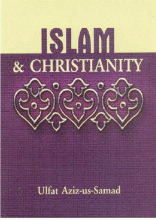Islam & Christianty

Political Constitution
Christianity does give some guidance with regard to what Aristotle described as private virtues, but is absolutely silent on the question of political virtues. The result of the separation of religion and politics in Christianity has been the growth of I Machiavellism in the West. Islam, on the other hand, being the last revealed Religion, and foreseeing the eventual evolution of humanity, has to formulate a basic code of comprehensive guidance for mankind in all their activities and relations, whether they fall within the public or the private sector. Islam ensures social justice and international peace by bringing political, economic and international relations and affairs under the control of religion and ethics and by defining the basic duties of the individual towards the state and of the state towards the individual and of one state toward another. It lays down some basic principles which every community is enjoined to adopt ` and then gives each the liberty to develop its structure according to the needs of the age, provided this superstructure observes the basic principles and remains within their scope. .
The first basic principle of the Islamic political system is that the sovereignty of the state rests with God and no legislature or parliament has the right to pass a law or act which is contrary to
the spirit and letter of the Commands of God as contained in the Glorious Qur'an and the precepts of the Prophet. Thus Islam ensures uniform justice and saves the state and the destinies of people from being swayed by the whims, shortsighted decisions of the legislators, and the minority group from the brute will of the majority, and the interests of the people as a whole from those of the dominating economic class in the parliament.
The Glorious Qur'an says:
(Say: O God, Owner of Sovereignty! Thou givest sovereignty unto whom Thou wilt and Thou withdrawest sovereignty from whom Thou wilt. Thou exaltest whom Thou wilt and Thou abasest whom Thou wilt. In Thy Hand is the good. Lo! Thou art Able to do all things.)
(3:26)
The second basic principle is that all men are equal before Law and in the Sight of God. They have equal political rights. The same Law applies to all. In an Islamic State no one, not even the head of the state, is above Law for the breach of any law, even the Caliph can be summoned in the court and punished, if found guilty.
The third basic principle is that all public offices, including that of the chief executive, are trusts from God, and the trustee must exercise the authority given to them as per the Command of God and for the benefit of the people. As the head of the state is appointed by them, he can also be removed by people, if they find that he is not carrying on the administration according to the Commands of God and in best interests of the people.
The fourth basic principle is that all public matters are to be decided by consultation and after taking into consideration the views of the citizens or the Islamic State:
(So pardon them and ask forgiveness for them and consult with them upon the conduct of affairs. And when thou art resolved, then put thy trust in God. Lo! God loveth those who put their trust in Him.)
(Qur'an 3:159)
(And those who answer the Call 0f their Lord and perform Prayer and whose affair is by consent among themselves and who spend on others out of what we have bestowed on them.)
(42:38)
Islam brings into existence the first true democracy in which there is no distinction of free-born and slave, citizen and serf, and no discrimination on the basis of race or color, or sex or creed. All are equal before Law and enjoy the same rights.
